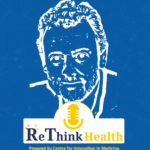How do we build forward better?
The functioning of the healthcare system during the war in Ukraine in the midst of hostilities and the Covid-19 pandemic, migration and its impact on the spread of diseases in the context of Eastern European realities – all this and much more in the first episode of the ReThink Health Podcast with Dr. Marius Geanta, President of the Centre for Innovation in Medicine, a European research & innovation organisation.
The first edition guest is Professor Richard Sullivan, Director of the Institute of Cancer Policy and Co-Director of the Center for Conflict & Health Research at King’s College London.
Through this podcast series and the ideas expressed we want to build forward better and to set the stage for the European Health Union, one in which the Eastern voice is also heard.
Together with experts, we aim to understand the depth and complexity of the problem facing the countries of Europe as a result of an unprecedented war in Ukraine. The destruction of medical infrastructure through attacks on medical facilities, hospitals, and convoys, as well as the constant changes the medical personnel is faced with, represent a turning point and created a whole new reality in Ukraine.
The Eastern European countries managed poorly the pandemic. During this war, millions of Ukrainians were forced to migrate. But primary recipient countries are still recovering after the fifth wave of the pandemic. By adding the burden of migrants and the threat of numerous infectious diseases, Eastern European health systems could be at the brink of collapse if they fail to work together to alleviate this burden.
It is difficult to even imagine the scale of losses and the necessary costs for the restoration of healthcare systems, especially Ukrainian. Funding is important, but not sufficient, says Prof. Sullivan. This complex task requires a plan and leaders should have already started the planning.




